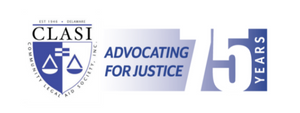The Disabilities Law Program (DLP) of Community Legal Aid Society, Inc. (CLASI) will be helping to enforce the Help America Vote Act (HAVA) and the Americans with Disabilities Act (ADA) during the General Election on November 7th. “We want to ensure that people with disabilities have full participation in the election process, including accessing polling places so they can vote independently and privately,” said Laura J. Waterland Esq., Supervising Attorney with the DLP.
According to a study by the National Council on Disability, 45% of voters with disabilities responding to a NCD survey encountered physical barriers at their polling places in the 2012 General Election, and 54% of surveyed voters encountered attitudinal barriers. For a copy of the study, please go to http://www.ncd.gov/publications/2013/10242013/.
On Election Day, CLASI staff and volunteers from Widener Law School and the University of Delaware will be monitoring selected polling places for accessibility for people with disabilities. CLASI is also collecting direct voter feedback and is asking voters to access the following link to report on their experiences Election Day. CLASI is asking individuals to fill out the survey after they have been to their polling places. The survey is available at www.declasi.org and at https://www.surveymonkey.com/r/DLP2016GeneralElectionSurvey.
Individuals with disabilities who encounter problems with access at their polling places should bring these barriers to the attention of poll workers, their county Board of Election, and the DLP at 302-575-0690, 302-575-0696 TTY/TDD in New Castle County; 302-674-8500 (also TTY/TDD) in Kent County; and 302-856-3742 (also TTY/TDD) in Sussex County.
Voters should be aware of their right to take a person of their choice into the voting booth should they require assistance in voting. They may also ask for assistance from official poll workers. People with cognitive impairments may vote, even if they have a guardian, under most circumstances. Voters with low vision or other impairments can utilize the ADAM modem on voting machines, which allows voters to listen to rather than read the ballot.
While presenting identification is preferred and will expedite the voting process, a voter without identification who is listed the poll book may sign an affidavit affirming their identity. Delaware does not require photographic, or any other identification, for most registered voters. If you are a first time voter who registered by mail, you may require identification. Whether voters bring identification or not, it may be helpful to bring mail, such as utility, tax, rent or mortgage statements showing their address.
If a person feels intimidated or interfered with in their ability to vote, they should immediately reach out to the polling site supervisor for assistance. It is illegal under Delaware law for a person to “by force, threat, menace or intimidation, prevent or hinder, any person….qualified to vote from voting according to said person’s choice at any such general, special or municipal election.” The only individuals allowed to challenge a person’s credentials are the two official party challengers located inside each polling location. It is worth noting that these challengers do not decide whether a person is eligible to vote; rather, a vote is taken of the two judges and the inspector. Individual voters who are found not be eligible after a challenge are to be offered a provisional ballot.
The Office of the Delaware Election Commissioner has a voter portal, https://ivote.de.gov/. At this site, a voter can check the status of registration and confirm assigned polling place locations. On Election Day, poll workers will make every effort to identify the correct polling place for voters who may have gone to the wrong polling place. However, voters should also be aware of their right to cast a provisional ballot in federal elections, should the polling place refuse to allow them to vote. Identification is required for provisional voting. Voters may also file complaints with the Delaware Election Commissioner.
The Help America Vote Act (HAVA) was enacted by Congress in 2002 to improve the administration of elections in the United States. A key provision of the Act includes improving voting access to individuals with disabilities. Under the Act, Congress appropriated money to state and local governments to:
- remove physical barriers to polling sites;
- provide information and outreach programs to individuals with disabilities about accessibility of polling places; and
- train election officials, poll workers and election volunteers on how best to promote the access and participation of individuals with disabilities in the elections process.
